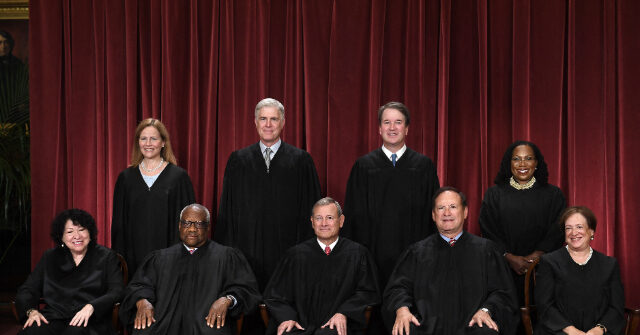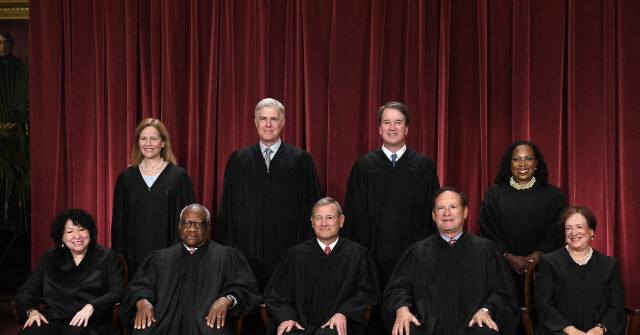
The Supreme Court ruled in a 6-3 opinion against an illegal alien who sought to secure a visa to stay in the United States after having been denied for allegedly being a member of the MS-13 gang.
In 2010, American citizen Sandra Munoz married Luis Asencio-Cordero, an illegal alien from El Salvador. Wanting to live together in the U.S., Munoz filed a petition with the U.S. Citizenship and Immigration Services (USCIS) to classify Asencio-Cordero as an immediate relative so he could apply for a visa.
After USCIS approved Munoz’s petition, Asencio-Cordero traveled to his native El Salvador to apply for a visa at a consular office. Asencio-Cordero underwent several interviews and was denied a visa on the grounds that he sought entry to the U.S. solely to engage in criminal activity.
Asencio-Cordero assumed he was denied the visa due to his alleged affiliation with the violent El Salvador-based MS-13 gang. Asencio-Cordero also assumed his visa was denied because of a tattoo he has which signifies gang membership.
Asencio-Cordero and Munoz then sued the State Department, alleging that Munoz had a right to live in the U.S. with her spouse under the Fifth Amendment and that by depriving her husband of a visa, she is owed due process to challenge in the courts the rejection of his visa application.
On Friday, Justice Amy Coney Barrett wrote for the majority, finding that “a[n] [American] citizen does not have a fundamental liberty interest in her noncitizen spouse being admitted to the country.”
Barrett writes:
Here, Muñoz invokes the “fundamental right to marriage,” but she actually claims something more distinct: the right to reside with her noncitizen spouse in the United States. That involves more than marriage and more than spousal cohabitation — it includes the right to have her noncitizen husband enter (and remain in) the United States. As Muñoz asserts it, she claims “a marital right . . . sufficiently important that it cannot be unduly burdened without procedural due process as to an inadmissibility finding that would block her from residing with her spouse in her country of citizenship.” So described, the asserted right is fundamental enough to be implicit in “liberty;” but, unlike other implied fundamental rights, its deprivation does not trigger strict scrutiny.
[Emphasis added]…
From this Nation’s beginnings, the admission of noncitizens into the country was characterized as “of favor [and] not of right.” And when Congress began to restrict immigration in the late 19th century, the laws it enacted provided no exceptions for citizens’ spouses. And while Congress has, on occasion, extended special immigration treatment to marriage … it has never made spousal immigration a matter of right. [Emphasis added]
…
Muñoz’s claim to a procedural due process right in someone else’s legal proceeding would have unsettling collateral consequences. Her position would usher in a new strain of constitutional law — one that prevents the government from taking actions that “indirectly or incidentally” burden a citizen’s legal rights. To be sure, Muñoz has suffered harm from the denial of Asencio-Cordero’s visa application, but that harm does not give her a constitutional right to participate in his consular proceeding.
[Emphasis added]
Previously, the District Court had sided with the State Department in the case, but the Ninth Circuit vacated the judgment and remanded the case, finding that Munoz had a constitutionally protected liberty interest in Asencio-Cordero’s visa application.
“The Ninth Circuit is the only Court of Appeals to have embraced this asserted right — every other Circuit to consider the issue has rejected it,” Barrett writes. “Today, we resolve the open question … we hold that a citizen does not have a fundamental liberty interest in her noncitizen spouse being admitted to the country.”
Barrett was joined by Chief Justice John Roberts, as well as Justices Clarence Thomas, Samuel Alito, and Brett Kavanaugh. Justice Neil Gorsuch filed a concurring opinion. Justices Sotomayor filed a dissenting opinion, joined by Justices Kagan and Jackson.
The case is State Department v. Munoz, No. 23–334 in the Supreme Court of the United States.
John Binder is a reporter for Breitbart News. Email him at jbinder@breitbart.com. Follow him on Twitter here.
Read More: World News | Entertainment News | Celeb News
Breitbart







